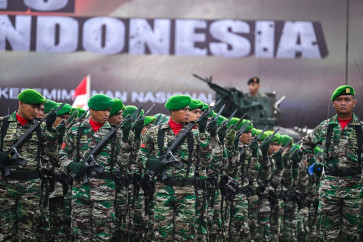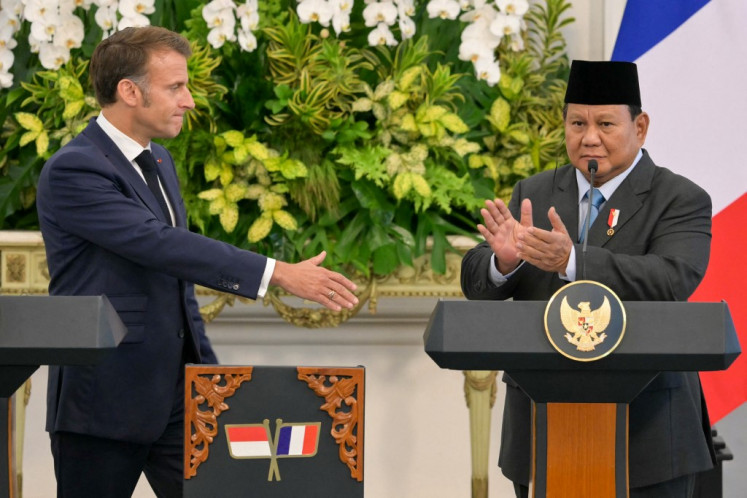New challenges for preemployment program
The government launched the preemployment card program to fulfill President Joko Widodo’s campaign promise to boost the country’s labor competitiveness with the issuance of Presidential Regulation No
Change text size
Gift Premium Articles
to Anyone

T
he government launched the preemployment card program to fulfill President Joko Widodo’s campaign promise to boost the country’s labor competitiveness with the issuance of Presidential Regulation No. 36/2020 on development of job competencies, signed in February.
The regulation mandates the establishment of a job creation committee responsible for formulating the program’s policies, as well as program management and evaluation.
As one of the government’s programs that aim to develop “superior human resources”, the preemployment card has created a “marketplace” where training participants and providers meet. The program has targeted 2 million participants and allocated a budget of Rp 10 trillion (US$637.27 million) for 2020. All Indonesians aged 18 years and above who are jobless or still studying may apply to the program, which requires all applicants to pass its selection process.
Each successful participant receives a training voucher worth Rp 5 million that can be used to attend the program’s training offerings, which are facilitated by the program’s digital partners. Upon completing a training course, each participant will receive a monthly allowance of Rp 650,000 for four months as an incentive. Finally, the program provides a job portal to match newly trained participants with industries.
The preemployment card program is indeed relevant to the present condition and future challenges of Indonesia’s labor market. The country’s unemployment rate in 2019 looks relatively OK at around 5.28 percent, or 7 million people. However, the figure does not fully reflect local labor conditions.
Special attention should be paid to the high unemployment rate among graduates, the mismatch between available jobs and job seekers, and the high youth unemployment rate.
The International Labor Organization data shows that Indonesia has one of the highest numbers of young people not in education, employment or training in Southeast Asia, at 22 percent of the youth population (ages 15 to 24).
Furthermore, Indonesia must also race against the growing global trend of automation and robotization. The skills needed in today’s era of disruption are very different from 10, even five, years ago. According to LinkedIn (2019), Indonesia has seen increased demand for digital skills such as social media marketing, human-centered design and gesture recognition technology.
In the 2019 Japan External Trade Organization (Jetro) survey involving 614 companies, Indonesia ranked third after Bangladesh and Myanmar for difficulty finding quality workers. Nonetheless, the comparatively high minimum wage in Indonesia remains a major issue. In addition, Indonesia still lags behind its neighboring countries in terms of Industry 4.0 due to a shortage of skilled workers, especially engineers.
Looking at these challenges, the preemployment card program is expected to incentivize people to improve their skills in this era of disruption. The training it offers not only covers digital skills such as analytics, social media marketing and programming, but also home economics skills like cooking, sewing and making coffee, and to business management skills like entrepreneurship.
Why skills training? One reason is because secondary and tertiary institutions can no longer guarantee quality labor. Some technology companies like Apple, Google and IBM have even done away with diplomas and degrees as a job requirement, and are instead looking at the specific skills an applicant possesses. Companies are following this trend, so relevant skills training will be needed in the future.
The business world, however, has complained about difficulties in sourcing ready-to-work employees. This problem stems from the fact that skills training has no cultural roots in Indonesia. There is a lack of incentives for companies, which deem professional training as a huge investment that does not necessarily pay off, not to mention the likelihood of rival companies poaching their trained employees.
Notwithstanding the differences in demographics, economic structure and labor conditions, Singapore’s SkillsFuture movement is a model that Indonesia can learn from. The Singaporean government launched the national movement in 2015, which extends training credit worth S$500 (US$351.29) to every citizen over 25. The offline-online training program includes the latest skills such as analytics, advanced manufacturing, digital media, cybersecurity and entrepreneurship. The movement’s S$1 billion annual budget is not much different from Indonesia’s.
SkillsFuture is also integrated with a national skills development strategy. Educational institutions such as universities and polytechnics are the main training providers, supported by both private and public institutions.
The preemployment card program can emulate SkillsFuture by transforming it into a government effort to raise awareness on deep learning in this era of disruption.
The COVID-19 epidemic, however, may give the government more housework to do. Adjustments must be made to match the latest conditions. The program can prioritize people who have been severely impacted by the epidemic, such as informal workers and micro, small and medium enterprises (MSMEs). All these points may necessitate the government to double the budget.
There are also consequences that the government should consider when it comes to program implementation.
First, the urgency of this program needs to be questioned. The preemployment card program can help improve workers’ skills and help accelerate economic recovery once the pandemic is over. But the existing budgetary resources can be used for other, more pressing needs. A portion of the Rp 20 trillion budget can be reallocated for safety net programs, like the direct cash assistance (BLT) program.
Second, the dissemination of information on the program must be increased. The government must explain to the public that the preemployment card program is by no means intended to provide wages to the unemployed, but a training incentive. Do not let the public mistakenly associate it with the BLT program.
Third, the increasing number of program beneficiaries, such as the informal sector and MSMEs, will be challenging. The program requires applicants to first pass a selection process, which means that they must be willing and able to take part in the training for a certain period of time. The consequence of having new beneficiaries is that the program’s original aims, such as providing skills improvement for youth and training incentives, will become diluted.
Finally, due to the current uncertainties and the physical distancing policy, online training takes precedence. Therefore, the government must prioritize online training programs, and subsidies for mobile data quota to help program participants can be considered.
The preemployment card program has the potential to disrupt policies because it prioritizes technology (data-driven), focuses on facilitation and emphasizes the role of the private sector.
Furthermore, the government needs to consider a “carrot and stick” policy. In other words, there must be understanding among the participants that the training incentive requires commitment and carries obligations as well consequences if they do not fulfill these conditions. This is crucial to selecting the right participants.
The data this program collects can help the government identify relevant projects, skills and jobs for the present and the future. The data will be very important in formulating a national employment strategy.
Finally, the public must realize that the preemployment card is only one program that addresses Indonesia’s labor issues. Improvements to job regulations, vocational education and curriculum are still needed for comprehensive reform of this sector.









